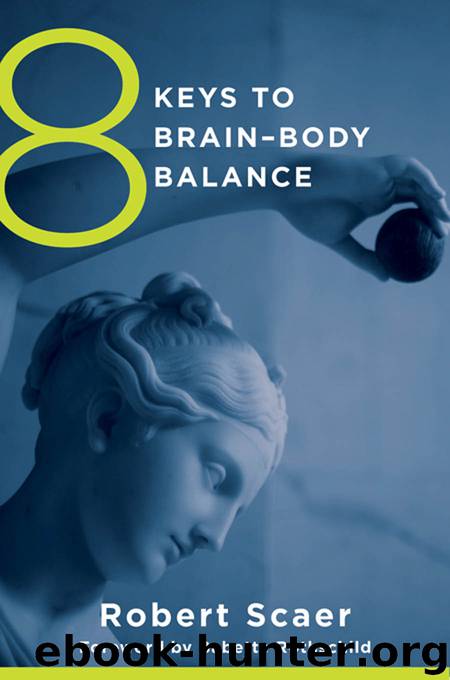8 Keys to Brain-Body Balance by Robert Scaer

Author:Robert Scaer
Language: eng
Format: epub
Publisher: W. W. Norton & Company
Published: 2012-08-02T16:00:00+00:00
The Plasticity of Brain Maps:
New Pathways that Compensate for Lost Ones
The organization of the cerebral cortex has often been referred to as a brain map. Precise, supposedly unchangeable regions of the brain were mapped out by neuroscientists early in the 20th century, particularly by Charles Sherrington. As I was taught in medical school, these maps were believed to be relatively identical from person to person. The term brain maps implies that specific regions of the cortex, especially the sensory cortex, relate to specific functions that are the same in all human brains. This concept has given rise to the concept of the homunculus, which presents as a map of the human body overlying the motor and sensory cortices (see Figure 1.2 on page 17). Note from the figure that the size of the representation of various parts of the body varies a great deal. One of the two most important functions that have evolved in the human species is speech (hence the huge part of the cortex devoted to the mouth and tongue). The second is the ability of the thumb to cross over, or oppose, the other fingers, which provided unique new functions for hand dexterity. So the tongue and thumb representations on the motor cortex homunculus (their brain maps) are both disproportionately large.
Scientists have developed techniques to measure brain maps over the exposed cortex of monkeys with increasing precision. With time, they’ve discovered that with sustained practice or training involving specific parts of the body, the brain map will actually increase in size. By the same token, relative disuse will shrink the brain map representing the neglected body part. That’s why prolonged immobilization in a cast, or other types of reduced use, such as that caused by pain, will reduce the size of the brain map for the impaired part of the body. It will also impair the skilled use of the neglected body part. I used to see this frequently in my rehabilitation center in patients with physical injuries to bones and joints requiring prolonged immobilization, or paralysis of limbs from temporary impairment of peripheral nerves not related to brain injury. These patients had lost motor skills—it was as if their brain had “forgotten” not only the skill but also the arm or leg itself! Fortunately, brain plasticity also allowed the patients to regain strength and skills through fairly detailed retraining and recovery of the “forgotten limb” and its brain map representation. Although I didn’t realize it then, restoring functional brain maps was the primary accomplishment of many rehabilitation procedures, even for impairment not related to neurological deficits or injuries.
Researcher Michael Merzenich (see Sharon Begley in the Recommended Reading section) is a pioneer in the study of neuroplasticity. Using minuscule electrodes on the exposed brain, he developed a method of measuring and charting brain maps in monkeys with exquisite accuracy and detail. Redrawing the brain map takes place through a number of different mechanisms. One remarkable way that the brain responds to brain injury is by the area of the cortex adjacent to the damage beginning to take over the lost function.
Download
This site does not store any files on its server. We only index and link to content provided by other sites. Please contact the content providers to delete copyright contents if any and email us, we'll remove relevant links or contents immediately.
Rewire Your Anxious Brain by Catherine M. Pittman(18642)
Talking to Strangers by Malcolm Gladwell(13344)
The Art of Thinking Clearly by Rolf Dobelli(10450)
Mindhunter: Inside the FBI's Elite Serial Crime Unit by John E. Douglas & Mark Olshaker(9317)
Becoming Supernatural by Dr. Joe Dispenza(8199)
Change Your Questions, Change Your Life by Marilee Adams(7756)
Nudge - Improving Decisions about Health, Wealth, and Happiness by Thaler Sunstein(7689)
The Road Less Traveled by M. Scott Peck(7592)
The Lost Art of Listening by Michael P. Nichols(7488)
Mastermind: How to Think Like Sherlock Holmes by Maria Konnikova(7320)
Enlightenment Now: The Case for Reason, Science, Humanism, and Progress by Steven Pinker(7306)
Win Bigly by Scott Adams(7183)
The Way of Zen by Alan W. Watts(6600)
Daring Greatly by Brene Brown(6501)
Big Magic: Creative Living Beyond Fear by Elizabeth Gilbert(5753)
Grit by Angela Duckworth(5601)
Ego Is the Enemy by Ryan Holiday(5412)
Men In Love by Nancy Friday(5232)
The Laws of Human Nature by Robert Greene(5170)
